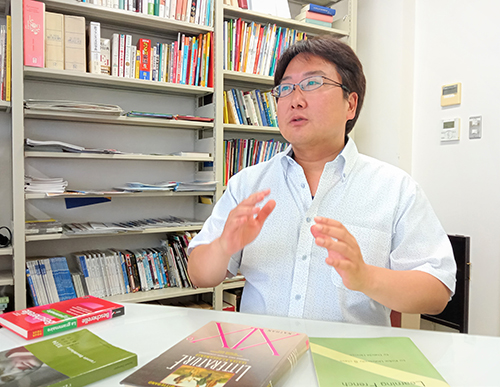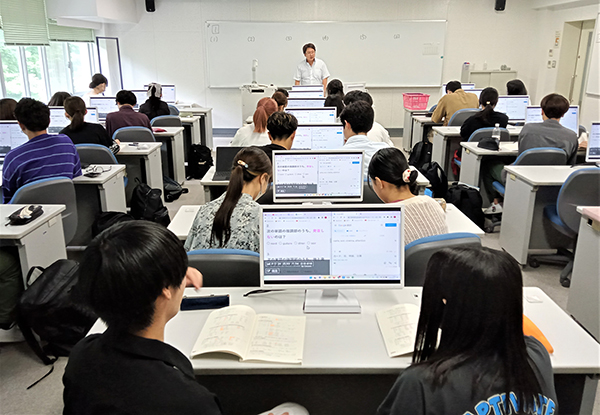
What makes a class attractive to university students? A clue to the answer may be found in the classes of "Best Teacher" winners that Kobe University announces based on student evaluations. The University selects Best Teachers twice a year for general education courses, including language courses mainly for first- and second-year undergrads. Teachers with five Best Teacher awards receive an Outstanding Teacher Award. We interviewed Associate Professor HIROTA Daichi of the School of Languages and Communication (SOLAC), a French teacher who has won an Outstanding Teacher Award, about how he manages his classes and his thoughts on language education.
Combining Multiple Modes of Communication

I was impressed by how the students enjoyed learning with their smartphones in your classes, competing for correct answers to quizzes and watching music videos for French songs. It demonstrated an awareness of how to use information and communications technology (ICT).
Associate Professor HIROTA: I am always mindful of increasing student participation. I try to focus on what students want, not what I want to teach. I am also deliberate about how I can use ICT. I use Quizlet, an online learning tool used worldwide. I adopted it after seeing a native-speaking teacher use it when I arrived at Kobe University.
Music videos are another way to get students interested in French. I mainly teach grammar classes, but I want students unmoved by grammar to find an interest some other way. I try to choose music from the 2000s onward that has easy-to-understand pronunciation and fits the students' tastes. I hope music will help students learn about French culture and society.
Language classes should combine various modes of communication. Fewer modes mean students not suited to them will not feel motivated. I hope that at least one method will resonate with students.
At the beginning of class, students present short essays they submitted after the previous week's class. What is your intent with this exercise?
Associate Professor HIROTA: The essays are not related to the class itself. Still, they briefly summarize the students' research on language, culture, and society in the Francophone world. They are like bite-sized reports. We do not have much time in grammar classes to learn about French culture and society. To compensate, I ask the students to pick a theme of their own interest and write a short report on that. They present their essays in front of the class, and I comment on them.
I came up with this approach based on my university experience, as I enjoyed hearing comments from my teacher. It was a French literature course, and at the end of each class, students would write down questions about the content of the class and submit them to the teacher, who would comment on them the following week. I decided to use this method to help students learn about France in general. It is another way to improve class participation by the students.
Teachers Should Not Talk Too Much
Did you excel at class management when you started teaching French?
Associate Professor HIROTA: In 2012, I started teaching at Otani University (Kyoto) as an assistant professor. I chose relatively easy literary works as the texts for my small intermediate class. However, I did not have a clear idea of what the students were looking for at the time. Knowing what I do now, I should have chosen material that allowed students to learn about French cultural and social topics in simple language. Literature may seem easy to read, like a picture book, but trying to decipher literature would prove complex. I realized I should not choose materials based on their apparent simplicity.
Looking back, I think I made a similar mistake when I was a university student[A1] . At the time, I thought I could learn French by reading French literature. However, when I studied abroad in France for about nine months during my junior year, I struggled to communicate in everyday life, as one might have expected. I did not fit in well with my surroundings, so I decided to study French by watching TV in the dormitory where I was staying. When I watched living French, I found unfamiliar words and expressions one after another.
I understood the content of the literature classes quite well during my study abroad program, but that was because the material was texts that allowed me to prepare for class. That experience made me think about how to study French.
You started teaching French at Kobe University in 2013. What innovations have you made over the past ten years?
Associate Professor HIROTA: Initially, I thought I would create my own textbook. In my own student days, I think it was common to think of English and French as entirely separate languages. However, I started thinking that it might be more efficient for students to learn from the similarities between the two, so I was preparing to publish a comparative textbook.
Nevertheless, I realized something as I was teaching. When I see students who are highly motivated to learn, they write notes in the textbook. This made me believe that learning could be more effective with notebook-like material with minimal content that students write in rather than textbooks with comprehensive explanations.
I plan my classes by thinking about how I can motivate students to learn independently. When I started teaching French, I attended a training program for newly appointed university teachers to learn teaching methods. What I learned there is still helpful today. The important thing is not to talk too much. The teacher is a coordinator for the class, working behind the scenes to promote student participation.
That is why we do a lot of pair work. Working in teams of four often leads to someone who does not speak. If I ask all students to pronounce a word in unison, only those who can pronounce it will speak up. I try to reduce such situations. Students also change seats every class.
Setting Up a Framework for Independent Learning
As a researcher, your area of expertise is the French poet Baudelaire. What sparked your interest in French literature?
Associate Professor HIROTA: I started reading novels when I was in junior high. I did not read much French literature then. Still, I immersed myself in the perspectives of various literary works, regardless of their era, country of origin, or style. I came to feel that literature offers pleasures inaccessible in everyday life. Despite taking a science track in high school, I chose to study literature at university. I ultimately chose my major based on my attraction to the French literature professor's classes, as I mentioned earlier.
Reading in the original language rather than translations, I began to appreciate not only novels but also French poetry. Reading poetry is similar to solving equations. Baudelaire uses elaborate turns of phrase in his poetry. Yet, there is a beautiful overlap between his phrasing and what he wants to express. I enjoy that sort of analysis. Equations have but one answer, while analyzing poetry is fascinating because each person produces a different result.
The target audience for foreign language classes varies from department to department; and not all students are interested in literature and languages. Does that present any difficulties?
Associate Professor HIROTA: In general, I think students focus on credits and grades. Therefore, I believe it is crucial to assign grades that students would accept. Teachers naturally must manage classes and provide materials to stimulate student curiosity, but we must not forget that grading is an essential link between teachers and students. I overlooked this perspective when I began teaching.
My classes are mainly for first-year students, so many are not used to the independent learning required at university. I try to remain cognizant that language classes are also a step toward understanding how to study at the university level.
What would you like to work on in the future?
Associate Professor HIROTA: While not concerning my classes, I am currently working on tandem French-Japanese learning, an extracurricular activity within Kobe University. Japanese students studying French are paired with Francophone exchange students to learn each other's language. More than a simple exchange, they decide their meeting times and study methods and submit simple reports after their partnership is concluded. We also hold a French presentation competition for Kobe University and Hyogo Prefecture high school students.
This academic year, the development of tandem language learning program was chosen to receive a Grant-in-Aid for Scientific Research. There is a limit to our human resources if only teachers teach. I remain conscious of my role in creating frameworks and programs that encourage independent learning in students.
Resume
| March 2004 | Graduated from the School of Letters, Osaka University, with a bachelor's degree in humanities |
| March 2006 | Graduated from the Graduate School of Letters, Osaka University, with a master's degree in literature |
| December 2011 | Graduated from Université de la Sorbonne nouvelle-Paris3, France, with a Ph.D. in literature |
| April 2012 | Appointed assistant professor at the Faculty of International Studies, Otani University |
| April 2013 | Appointed instructor at the School of Languages and Communication (SOLAC), Kobe University |
| April 2016 | Appointed associate professor at SOLAC, Kobe University |






